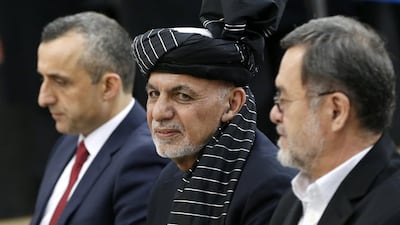Afghan President Ashraf Ghani and Chief Executive Dr Abdullah Abdullah joined a field of 17 candidates for July’s presidential election as nominations closed yesterday.
Other prominent contenders for the post include Hanif Atmar, who resigned as national security adviser last year because of differences with Mr Ghani on policy issues, as well as former warlord Gulbuddin Hekmatyar.
Each candidate has two vice presidents also running on their ticket.
The July 20 election is being held three months late because of security concerns and to fix logistical problems faced in Afghanistan’s parliamentary elections in October.
After weeks of rapidly shifting alliances among the main political players, Mr Ghani named one of his sternest critics, former spy chief Amrullah Saleh, as his pick for first vice president.
Mr Saleh was appointed interior minister last month but resigned on Saturday to be able to register for the election.
“Even as a critic of this government, I must say Ashraf Ghani has made a very smart move by bringing Mr Saleh on board,” political analyst Ejaz Malikzada said.
Mr Malikzada said allying with Mr Saleh would silence some of Mr Ghani’s opponents or win their support.
“As interior minister for the past 27 days, Mr Saleh has already shown that he can work alongside Mr Ghani and deliver results,” he said.
He was referring to drastic reforms Mr Saleh introduced, such as giving more power to the police while imposing stricter accountability on officials, and acting against corruption.
Mr Ghani won the 2014 presidential election after a run-off vote against Dr Abdullah, who accused him of fraud and refused to accept the result.
Dr Abdullah relented after the US brokered an agreement for a national unity government under which he was given the newly created post of chief executive.
For this election, Dr Abdullah has the support of the Junbish party led former warlord Abdul Rashid Dostum, which gives him the support of Afghanistan’s Uzbek minority, and the Wahdat party of Karim Khalili, former vice president and a leader of the Hazara ethnic minority.
_____________
Read more:
Taliban rejects US peace talks in Pakistan
Waiting in hospital rooms, Afghans wish for peace after Kabul blast
Taliban execution of radio host portends another bad year for Afghan journalists
_____________
Dr Abdullah is also backed by a section of Jamiat-i-Islami, one of the biggest opposition parties that is dominated by the Tajik ethnic group, even though its influential leader Atta Mohammad Noor has declared support Mr Atmar.
Mr Atmar is running alongside former vice president Yunus Qanooni and the current deputy chief executive, Mohammad Mohaqiq.
“Mr Atmar has agreed to many of the demands made by Mr Noor, including changing the government structure to legitimise the position of a prime minister in the constitution,” a party source said. “That was very important to Mr Noor.”
“Among other demands are representation of all ethnicities in the future government, as well as giving more power and authority to the governors of provinces to act independently in certain matters,” he said.
Mr Noor was the longest serving governor of Balkh province and had resisted the president’s order to step down in 2017.
He resigned last year but controls large parts of northern Afghanistan.
Meanwhile, Mr Hekmatyar, who returned to Afghanistan from Pakistan in 2017 after receiving a government pardon, sought to form a political alliance with the Taliban but was rebuffed by the militants.
The insurgents reject the elections and often refer to the Afghan government in Kabul as a “puppet regime”.
Mr Hekmatyar has registered Fazal Wazin and Qazi Ur Rehman Naqi, members of his Hizb-e-Islami party, as his vice presidential candidates.
The next task for Afghan election officials is to check the eligibility of the candidates and verify the 100,000 endorsements from citizens that each must produce.
“Their IDs, documents as well as the 100,000 tazkeras [national IDs] provided will be evaluated,” Independent Election Commission deputy spokesman Mirza Haqparast said.
“Those cleared will then move to the primary list of candidates.”

